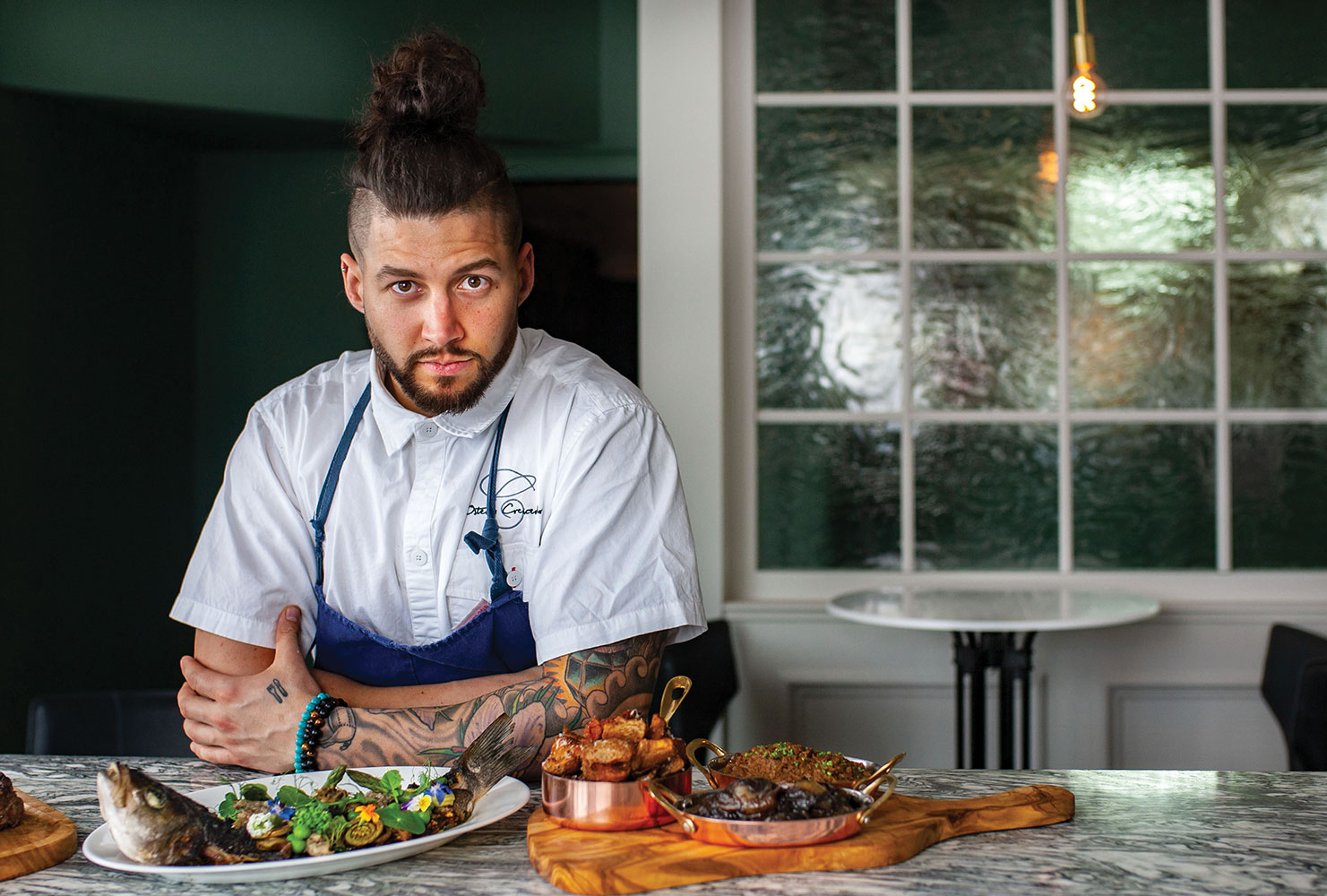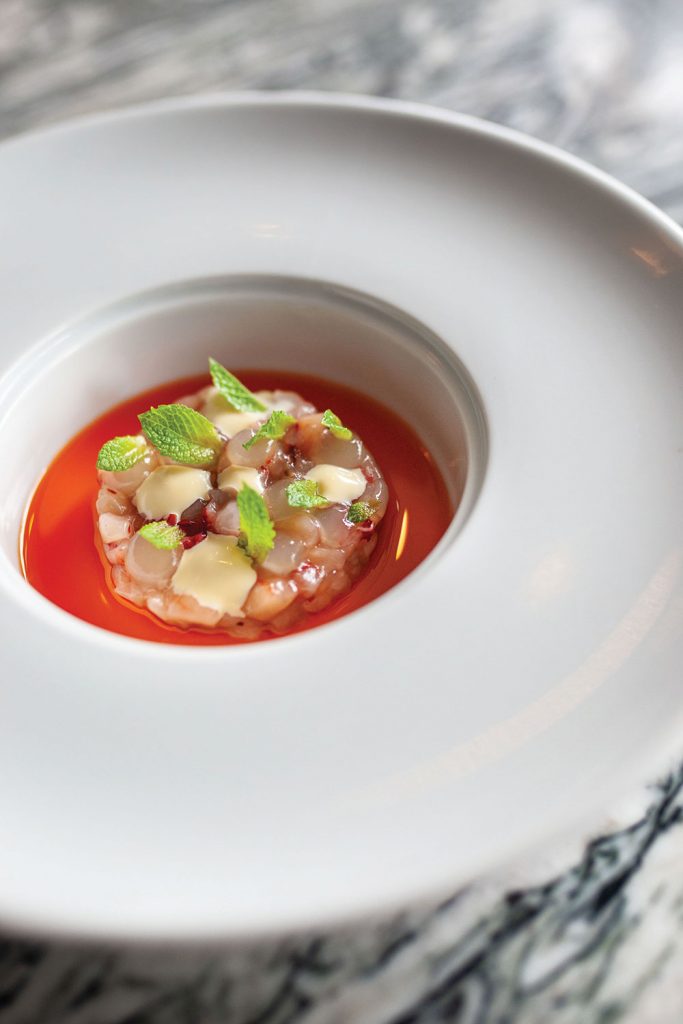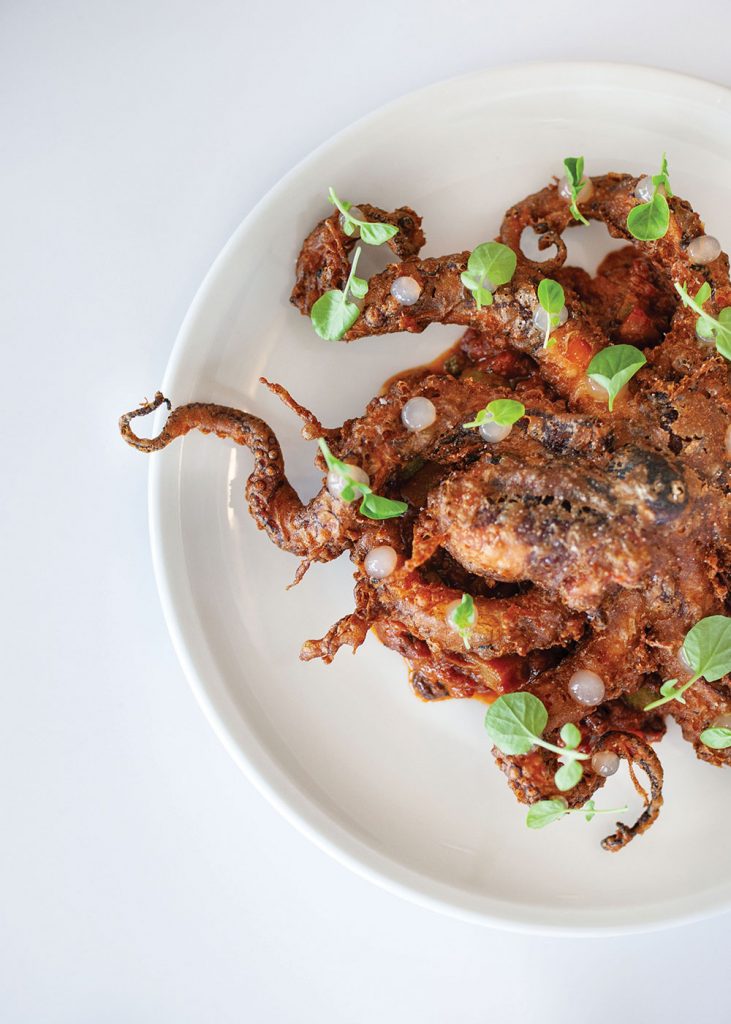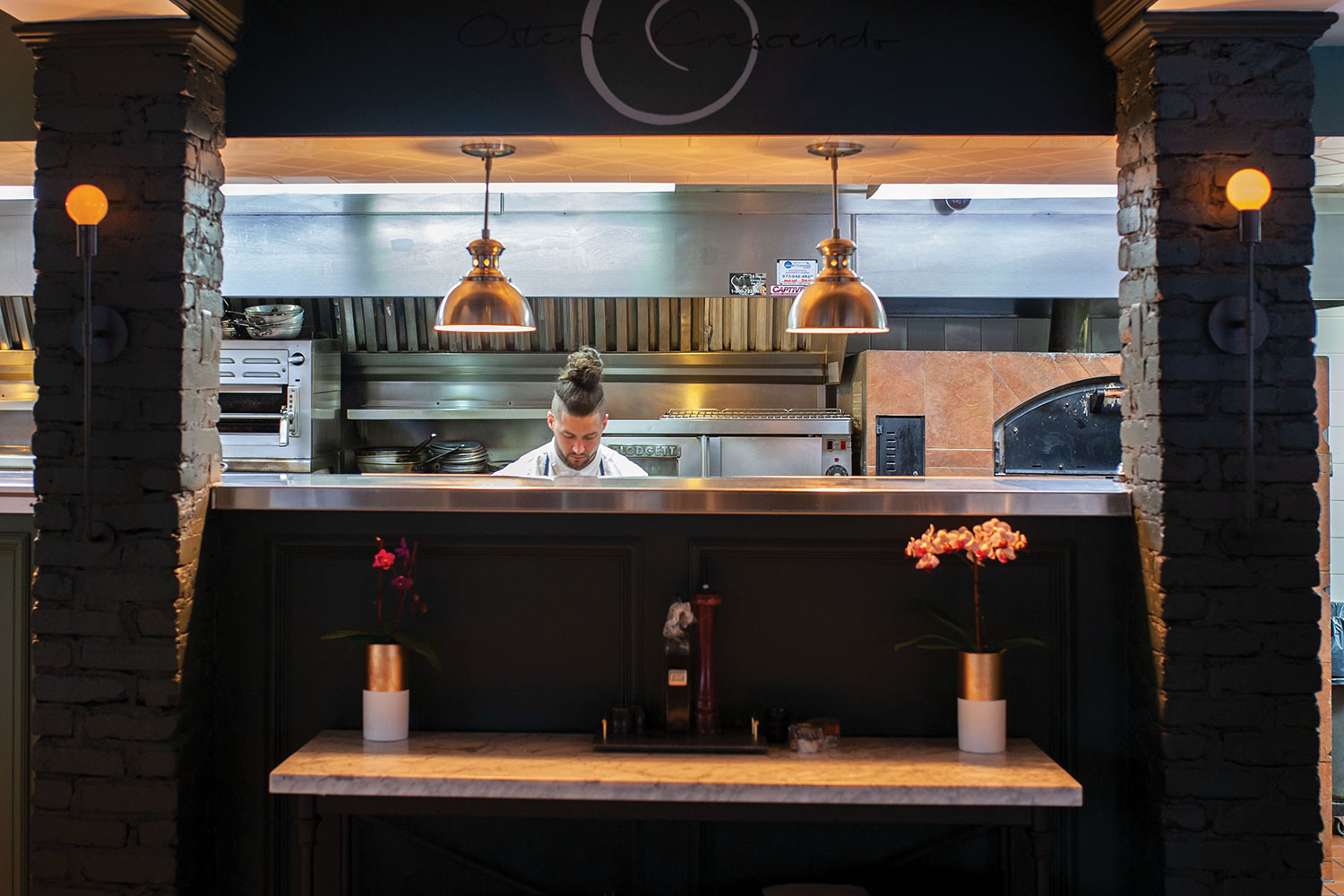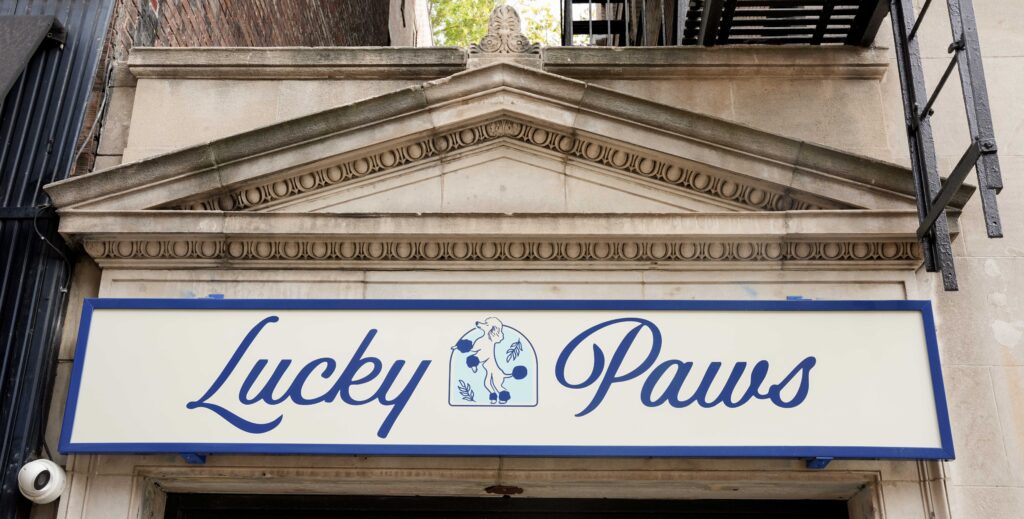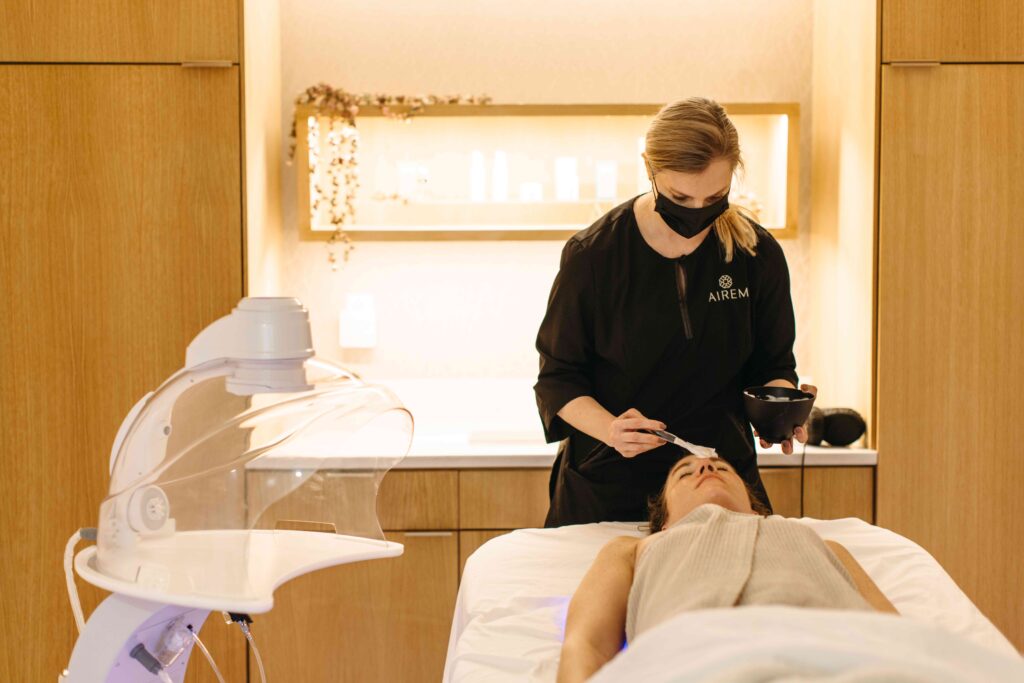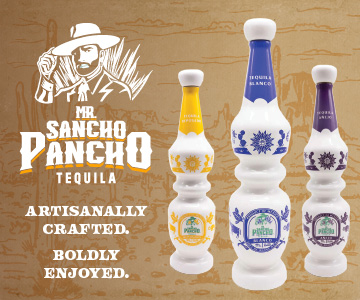—28-year-old Chef Robbie Felice opens his second restaurant, Osteria Crescendo, in downtown Westwood.
The first time I met Chef Robbie Felice, it was just after the opening of his first restaurant, Viaggio. The then 26-year-old wowed me and my dinner companions with his house-made pastas and big food IQ. We talked about everything from his in-house salumi program to working in Michelin-starred kitchens—even how the young chef used to skip class at the Culinary Institute of America to forage for ramps and sell them to restaurants in NYC.
After I nearly tasted the entire menu in one sitting, it was obvious Felice and company had finally given Passaic County foodies something to shout about. Viaggio was the cool kid, the rebellious teen that got straight A’s. The servers were well-educated, the food had an identity and Felice’s story was like a good paperback page-turner every diner who walked through the door had to know.
For New Jersey’s biggest rising-star chef—who can be spotted riding a Ducati 959 in what little he allots for freetime—it’s always about “taking things to the next level.” It’s true, both of Felice’s grandmothers were exceptional cooks and his father, Joe Felice, has been a successful restaurateur for some time. But it’s Felice’s ambition and spunky energy that’s ultimately landed him among the state’s elite at such a young age. So it came as no surprise to me when he called to tell me he was opening another Italian restaurant, Osteria Crescendo.
This time, Felice has moved onto Bergen County, where the audience (and critics) are bigger. When I first pulled up to the restaurant’s show-stopping corner location in the heart of downtown Westwood, I half expected to walk into Viaggio Two. But after stepping over the ceramic black and white geometric hexagon tiles depicting the facade’s “No. 36” address, it became abundantly clear that Crescendo had its own identity.
A far cry from the Tuscan farmhouse interior of Viaggio, Osteria Crescendo’s vibe is posh, modern and yet still has its callbacks to the old country. The space is split in two: one side for Crescendo’s bar (a first for Felice) and its pristine dining room filled with details such as white marble tabletops and glasses reminiscent of Italian craftsmanship. In the evenings, with a wide range of music playing, it almost seems as though you’re in the heart of some hip, new NYC restaurant—albeit with a wrap-around full glass window preceding scenic views of Jefferson Ave.
Much like the name “Crescendo” implies, Felice is looking to make some noise rather than simply produce a carbon copy of his highly-regarded Wayne restaurant. And at just 28, with two restaurants under his belt, he’s not at all concerned with how young he or his team are. In fact, that youthful spirit is what gives Osteria Crescendo its edge. “I’ve always looked up to people that were super young, even if they were my boss—and especially if they had a ton of energy. That energy keeps our staff motivated. This restaurant wasn’t just for me—it was for my entire staff and everyone that’s been a part of Viaggio. It’s the next step for all of us,” Felice said.
“When I left CIA and did my internship at Babbo, I did it because that’s what I had to do. You’re constantly growing your resume but at the same time, you always need to be growing your knowledge. If you’re not doing that, you’re dead in the water. Most people see the industry as money, but it’s not just about money. If you’re not growing your knowledge, you’re not really leveling up. All these places I’ve worked at were places I knew I needed to be. As I’m sitting here with two restaurants, I’m still thinking about the next steps of where I want to be—that hunger for wanting more.”
Felice has created two distinctive dining concepts for Crescendo. At the bar, he tapped seasoned beverage director Joshua Strauss for Italian-style cocktails to go with the room’s menu: think Italian street food like stuffed arancini (fried rice balls) with gorgonzola dolce. When it comes to the dining room, he has curated a menu around large-scale entrées under “Per la Tavola” (meaning “for the table”) which are preceded by equally shareable apps and house-made pastas which incorporate more of what Felice likes to call, “foodie food.”
One way for Felice to flex his high food IQ is with his premier starter, Gamberi Rossi (red prawn) Crudo. The idea sparked from the chef’s trips to Italy, where diners suck the brains from the prawn’s head as a sort of delicacy. He wanted to bring that flavor home, but also knew he had to find a way to introduce it without asking us fussy New Jerseyans to suck out prawn brains.
“When I created the dish, I thought, ‘How many people in New Jersey are going to pick up this shrimp and suck the brains out?’ So I ate at a few Michelin-starred restaurants in Europe and I remember this one served it as a crudo. It was one of the best things I’ve ever eaten. That dish inspired me to serve it as a crudo here, with shrimp head oil that’s almost as red as the shrimp themselves. You get that super intense flavor from the head and the raw part of the tail is marinated in lemongrass, ginger, gin and mint. A lot of Michelin-starred restaurants in Italy almost do Italian food without boundaries. I wanted to take things like lemongrass that you wouldn’t think about in Italian food, and give the dish a higher level of flavor that you normally don’t get in New Jersey. The gin for instance, acts like a drying agent when you’re eating this raw shrimp. Then you have lemon gel and roasted garlic crema over the top with fresh mint, which is the kicker to freshen up the dish. It’s a more foodie dish for sure,” Felice explained.
One of the few similarities that connects Osteria Crescendo with Viaggio, are Felice’s house-made pastas. The Farfalle in meat sauce with lacinato kale and Parmigiano Reggiano has already become a local favorite. Then there’s the Paradiso Ravioli, which just might be the most picture-perfect pasta dish out there with its perfectly-cut frilly edges and vibrant yellow color from the farm-fresh eggs. Inside, it’s made with six different cheeses imported from Italy. Outside, it’s dressed in white sauce on a white plate (which gives the dish its color pop), and zig-zags of Calabrian chili oil reminiscent of red chili threads.
When you sit down to eat a dish,” Felice said, “you eat with your eyes first. Then you eat with your nose. Then you dive in. We cut it with a lemon butter that’s super rich. When you first try it, that Calabrian chili hits the back of your throat and it feels like it’s going to be too spicy. Then it gets washed away with that smooth lemon butter.”
It’s true, the apps and pastas are bold and creative—the sort of thing we expect from Felice at this point. Rather than simply piggyback off Viaggio’s menu, Felice wanted to do some hip, new things. Whether you’re eating at a hidden gem in the back streets of Florence or right in Wayne at Viaggio, you’ll notice couples and friends picking at each other’s dishes or practically trading entrées at the midway point. This concept of community is one embedded into the identity of Osteria Crescendo: sharing plates, discussing food, etc.
“Anyone can open a restaurant and simply put the basics on the menu. You have to ask yourself, what’s going to set this restaurant apart from the one down the street? I wanted all these large-scale entrées to have a WOW factor,” he said. “If someone is coming into my restaurant and spending $80 on one of these shared dishes, it has to be exciting.”
Felice has designed these entrées to be show-stoppers, and the Branzino and Polpo Fritto (fried octopus) are just that. And though it may almost seem typical to have an octopus or branzino on an Italian menu, the fish and octopus are whole. And these almost too beautiful to eat sea monsters are quick to garner those, “Oh my god” moments when they hit the table.
“I always want to do something that no one else is doing,” Felice said. “When we opened Viaggio I put octopus on the menu as an appetizer, which is what everyone does. It’s a pretty safe and textbook move. When we were testing recipes one day, I said, ‘You know what, I’m just going to serve a whole fucking octopus.’ Literally all my cooks’ eyes lit up. Seeing that reaction means, ‘Hey, that’s it!’ That’s exactly the reaction I wanted.”
“I hit the books and started to figure out how I wanted to go about doing it. I love throwing in little twists. We fry the whole octopus and add a sort of Asian influence with the tempura. The octopus gets braised from four to six hours to make it insanely tender. Staying true to the super simple Italian style, we’re taking this beautiful product and doing something crazy/cool with it: putting it on the plate so it almost looks like it’s swimming.”
The Polpo Fritto stays true to those rustic vibes, with a classic eggplant puttanesca where you really get a taste of the old country. The modern twist—other than the obvious—are little dots of citrus gel on top, so you get a bit of lemon with every bite to play off the puttanesca.
When it comes to large-format though, the tomahawk ribeye is the obvious crown jewel. Felice doesn’t want Osteria Crescendo to be considered a steakhouse, but a big dry-age steak was the perfect way to get diners to understand the large-scale entrée vibe.
“It’s so rewarding to see a large party come in, order correctly and watch them all share these entrées. When we decided on large-format, I had already started the dry-age program at Viaggio so it was the perfect time to add it at Osteria Crescendo. One night I went out to eat in New Jersey and the restaurant claimed to have dry-aged steak and I just thought, ‘This is nothing like a dry-aged steak.’ When I was working in Vegas, I was helping out at CarneVino and I really got to see how to properly dry-age and what it does to meat. After working with Mario [Batali], I asked myself, ‘Who the hell would ever put steak on the menu and not dry-age it?’ So when I started my own production, I got to show my cooks and customers what real dry-aging flavor does. When we break these things down it smells like blue cheese, but in a good way. We knew it needed to be a showstopper. It’s our most expensive dish for sure, but if you’re ordering correctly and sharing with three or four people, it makes total sense.”
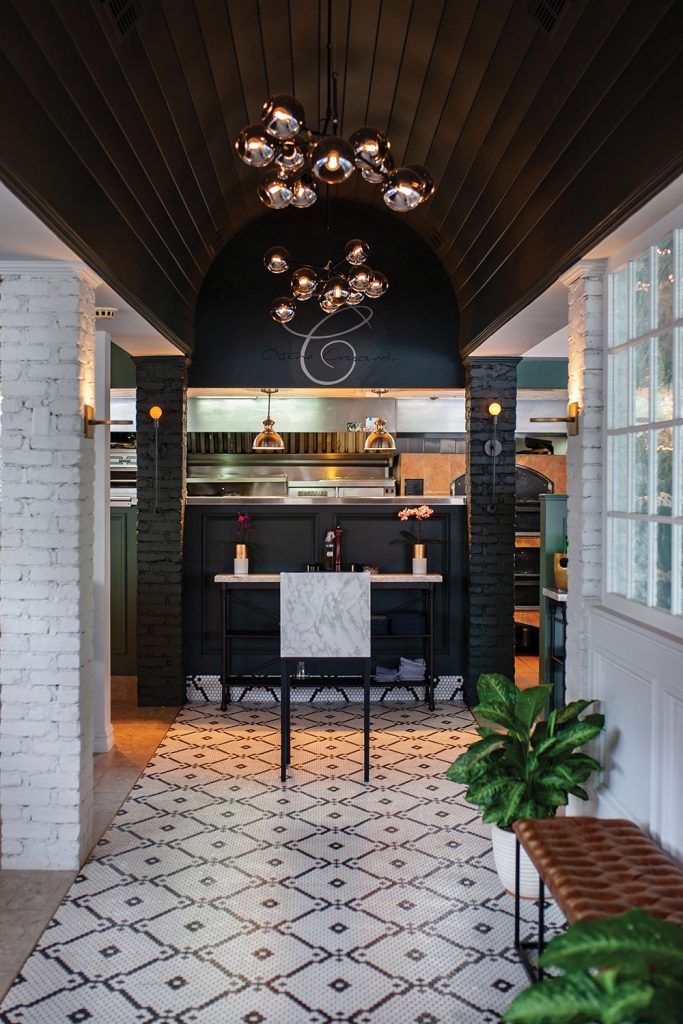 From the day he opened Viaggio, Felice was already planning for Osteria Crescendo. And there’s no doubt his wheels are already turning for what’s to come. But what the New Jersey-native has done in just a few short years, has helped shape the future of our state’s ever-growing dining scene. And that starts with doing something different.
From the day he opened Viaggio, Felice was already planning for Osteria Crescendo. And there’s no doubt his wheels are already turning for what’s to come. But what the New Jersey-native has done in just a few short years, has helped shape the future of our state’s ever-growing dining scene. And that starts with doing something different.
“I get a lot of people who ask, ‘Why didn’t you just make Viaggio Two?’ Sure it would’ve been successful, but I’m someone who gets bored easily. So why would I ever want to do that? To create something that’s an entirely new concept—that’s what it’s all about. I don’t work 18 hours a day to create the same thing over and over again. This was a chance for us to have some fun and really be creative. We still have people coming into Viaggio for the first time and hearing our story—that’s what makes it so special. It shows a lot more love when you’re creating a whole new story.”
Felice’s larger story however, also echoes how much today’s popular chefs have almost become modern day rockstars. With two of the state’s top restaurants before the age of 30, it’s clear that it may only be a matter of time before Felice—New Jersey’s “rockstar” chef—sets his sights on a big city. “The hospitality industry is constantly changing and growing and evolving. Nowadays, you can’t even go to a party or an event where there’s not food or drinking. When I was younger I was more narrow-minded in that, I would create an awesome dish but now it’s more about how that dish fits the vibe of my restaurant—or even what my next move is.”
Photography by Peter Bonacci

